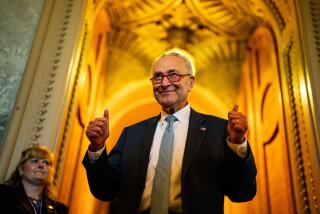Senate Removes Liability Cap on Tobacco Bill
- Share via
WASHINGTON — The fate of the giant tobacco bill was thrown into limbo Thursday after conservatives who want to kill it joined with hard-line tobacco foes to scrap the only remaining provision that might have averted a potentially crippling legal challenge by the tobacco industry.
In what many saw as a poison pill, senators voted 61 to 37 to strip the bill of its major legal protection for tobacco companies: a cap of $8 billion on the amount that they could be made to pay in settlements and judgments in any one year.
The bill, which for the first time would sharply regulate the $50-billion industry, whose products are considered the leading cause of preventable disease and death in this country, is one of the most complex and significant pieces of social legislation to be considered in recent decades.
The measure would raise cigarette taxes by at least $1.10 a pack over five years and spend the revenue on an array of public health and anti-smoking programs, while allowing tobacco to be regulated by the Food and Drug Administration.
But in its vote Thursday, the Senate endorsed an amendment by Sen. Judd Gregg (R-N.H.), a conservative, and Sen. Patrick J. Leahy (D-Vt.), one of the tobacco industry’s leading foes, to eliminate the $8-billion liability cap.
In doing so, they also eliminated any chance of Senate approval before the Memorial Day recess and raised doubts about the bill’s chances of passage when debate is resumed in June.
Sen. Dianne Feinstein (D-Calif.) voted for the cap. Sen. Barbara Boxer (D-Calif.) abstained.
The House has yet to move its version of a tobacco bill, although Republican leaders said they will introduce a narrower measure in coming weeks.
Sen. John McCain (R-Ariz.), chief sponsor of the Senate bill, described Thursday’s vote as a setback but “nothing fatal.” He voiced confidence that a bill will pass because “the American people expect nothing less from us.”
One of those who disagreed was Majority Whip Don Nickles (R-Okla.), who said that the liability cap is only one of many objectionable features in the bill.
“I think a lot of us don’t like the bill,” said Nickles, who engaged in a mini-filibuster Thursday to hold up votes on the measure, knowing that delay worked against chances of passage.
He and other conservatives have been condemning the McCain measure as a huge tax increase that would do more to expand the federal bureaucracy than stem smoking. They voted to strip the legal protection for tobacco companies to disassociate the GOP from tobacco interests and at the same time make the bill politically unacceptable to moderates of both parties.
Anti-tobacco Democrats supported the amendment because they are philosophically opposed to granting legal safeguards to the industry.
“We have turned a good bill into a better bill,” Leahy said after the vote.
Former Surgeon General C. Everett Koop and former Food and Drug Commissioner David Kessler also lauded the vote as “a tremendous victory for public health and the millions of victims of the tobacco industry.”
However, Richard Scruggs, a lawyer for 30 states that would receive billions of dollars from the bill, called the vote “very disappointing” and “a major over-reach for the left.”
He said that militant foes of tobacco had “demagogued” the issue of the liability cap so thoroughly as a benefit to tobacco companies that in the current political climate some Republicans feared to vote for it.
To supporters, the cap was seen as a way to hold the support of moderates and perhaps coax the industry into reluctantly accepting the bill.
Because of the way the bill was written, industry acceptance would be required to implement some important provisions, such as strictly limiting tobacco marketing and advertising and the payment of steep fines if youth smoking fails to decline to specified levels. Those provisions might be unconstitutional, if imposed by Congress, and the liability cap was a sweetener aimed at getting the companies to sign agreements implementing these terms.
The White House had lobbied against removing the cap to enhance the bill’s chance of passing. But a spokesman said Thursday night that President Clinton could support the bill with or without the cap. However, the spokesman criticized some of those who voted to strip it.
“There were obviously some people who argued that [stripping the cap] strengthened the bill who in reality want to kill the bill,” said Joe Lockhart. “But we think there is tremendous momentum behind passing comprehensive legislation.”
Industry officials had campaigned against the bill because, in their eyes, the liability cap being offered was too limited.
Tobacco spokesman Scott Williams, referring to Thursday’s vote, said: “Everyone’s piling on. We have been saying all along that the atmosphere in Washington is not conducive to a comprehensive resolution of tobacco issues.”
The legislation grew out of a proposed settlement reached last June between tobacco companies and 40 state attorneys general whose massive lawsuits seeking recovery of smoking-related health care expenditures forced the industry to the bargaining table.
Legal protections contained in the settlement required congressional approval, but Congress refused to embrace the deal. As a result, the state lawsuits are still not settled, except for the four with the earliest trial dates, and some of the states may be growing impatient.
More to Read
Sign up for Essential California
The most important California stories and recommendations in your inbox every morning.
You may occasionally receive promotional content from the Los Angeles Times.













